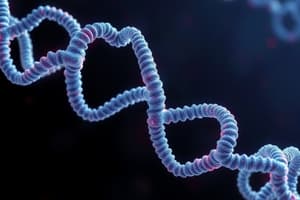Podcast
Questions and Answers
What role do ionic interactions play in the protein folding process?
What role do ionic interactions play in the protein folding process?
- They contribute to the formation of local secondary structures. (correct)
- They initiate the folding of the entire polypeptide chain.
- They are irrelevant to the folding process.
- They are detrimental to protein folding stability.
Which of the following diseases is NOT associated with amyloid fibril formation?
Which of the following diseases is NOT associated with amyloid fibril formation?
- Cystic fibrosis (correct)
- Type 2 diabetes
- Huntington disease
- Alzheimer disease
What is the significant consequence of misfolded amyloid polypeptide in relation to type 2 diabetes?
What is the significant consequence of misfolded amyloid polypeptide in relation to type 2 diabetes?
- Reduction in insulin secretion. (correct)
- Increased insulin production.
- Accumulation in cardiac tissues.
- Improvement of glucose metabolism.
Which misfolded protein is associated with Parkinson disease?
Which misfolded protein is associated with Parkinson disease?
What primarily leads to the disease-causing aggregation of β-amyloid?
What primarily leads to the disease-causing aggregation of β-amyloid?
What causes cystic fibrosis at the molecular level?
What causes cystic fibrosis at the molecular level?
What primarily contributes to stabilizing the globular form of most soluble proteins?
What primarily contributes to stabilizing the globular form of most soluble proteins?
What prevents free rotation around peptide bonds?
What prevents free rotation around peptide bonds?
Which dihedral angle is limited to trans configurations?
Which dihedral angle is limited to trans configurations?
Which type of secondary structure maintains consistent φ and ψ angles throughout?
Which type of secondary structure maintains consistent φ and ψ angles throughout?
What is the angle range for the φ (phi) dihedral angle?
What is the angle range for the φ (phi) dihedral angle?
Which of the following is NOT a common type of protein secondary structure?
Which of the following is NOT a common type of protein secondary structure?
The increase in entropy associated with the hydrophobic effect is due to the behavior of which molecules?
The increase in entropy associated with the hydrophobic effect is due to the behavior of which molecules?
What characterizes the peptide bond in proteins?
What characterizes the peptide bond in proteins?
Which of the following best defines secondary structure in polypeptides?
Which of the following best defines secondary structure in polypeptides?
What is the primary factor contributing to the rigidity of the peptide bond?
What is the primary factor contributing to the rigidity of the peptide bond?
What primarily influences the stability of a protein's conformation?
What primarily influences the stability of a protein's conformation?
What contributes to a protein's native conformations being thermodynamically stable?
What contributes to a protein's native conformations being thermodynamically stable?
How does the clustering of nonpolar groups affect a protein's folding?
How does the clustering of nonpolar groups affect a protein's folding?
Which type of interaction is most numerous in stabilizing a protein's native conformation?
Which type of interaction is most numerous in stabilizing a protein's native conformation?
What is the role of van der Waals interactions in protein stability?
What is the role of van der Waals interactions in protein stability?
What does high conformational entropy in unfolded proteins indicate?
What does high conformational entropy in unfolded proteins indicate?
The hydrophobic effect in protein folding is primarily due to?
The hydrophobic effect in protein folding is primarily due to?
Why are strong disulfide bonds considered uncommon in stabilizing protein structures?
Why are strong disulfide bonds considered uncommon in stabilizing protein structures?
What is primarily formed by the packing of hydrophobic amino acids in a protein?
What is primarily formed by the packing of hydrophobic amino acids in a protein?
Which secondary structure corresponds to region A on the Ramachandran plot?
Which secondary structure corresponds to region A on the Ramachandran plot?
Which secondary structure is associated with region B in the Ramachandran plot?
Which secondary structure is associated with region B in the Ramachandran plot?
What term describes the overall three-dimensional arrangement of all atoms in a protein?
What term describes the overall three-dimensional arrangement of all atoms in a protein?
What characterizes quaternary structure in proteins?
What characterizes quaternary structure in proteins?
What is a primary feature of globular proteins compared to fibrous proteins?
What is a primary feature of globular proteins compared to fibrous proteins?
Which of the following proteins is most likely characterized as globular?
Which of the following proteins is most likely characterized as globular?
What type of interactions hold together the tertiary structure of proteins?
What type of interactions hold together the tertiary structure of proteins?
Which structure is primarily responsible for the compact nature of globular proteins?
Which structure is primarily responsible for the compact nature of globular proteins?
How many residues does human serum albumin consist of as a globular protein?
How many residues does human serum albumin consist of as a globular protein?
In the context of protein structures, what does the term 'mixed right-handed alpha helices and beta sheets' refer to?
In the context of protein structures, what does the term 'mixed right-handed alpha helices and beta sheets' refer to?
What is assigned to each structure in the Protein Data Bank?
What is assigned to each structure in the Protein Data Bank?
Which of the following proteins has the highest proportion of α-helix structure?
Which of the following proteins has the highest proportion of α-helix structure?
What is a characteristic feature of intrinsically disordered proteins?
What is a characteristic feature of intrinsically disordered proteins?
What results from the denaturation of proteins?
What results from the denaturation of proteins?
What is required for the hydroxylation of proline and lysine in collagen formation?
What is required for the hydroxylation of proline and lysine in collagen formation?
What is the basic structural unit in a protein's quaternary structure called?
What is the basic structural unit in a protein's quaternary structure called?
Which proteins have a notable absence of β conformation?
Which proteins have a notable absence of β conformation?
What occurs during the renaturation of proteins?
What occurs during the renaturation of proteins?
What is the role of proteostasis in cells?
What is the role of proteostasis in cells?
Which statement about collagen structure is correct?
Which statement about collagen structure is correct?
Flashcards are hidden until you start studying
Study Notes
Overview of Protein Structure
- Protein conformations are thermodynamically stable states with the lowest free energy.
- Native proteins refer to folded conformations necessary for functional activity.
Stabilization of Protein Conformation
- Stability of proteins is largely influenced by weak interactions rather than rare strong covalent bonds like disulfide bonds.
- Prominent weak interactions include hydrogen bonds, hydrophobic effects, ionic interactions, and Van der Waals forces.
- Unfolded proteins feature high conformational entropy, making them less stable compared to their folded counterparts.
Hydrophobic Effect in Protein Folding
- The hydrophobic effect drives protein folding by reducing the solvation layer around nonpolar groups, increasing overall entropy.
- Hydrophobic R chains cluster to form a core, promoting stable structure.
Van der Waals Interactions
- Although individual van der Waals interactions are weak, their cumulative effect significantly contributes to protein stability and promotes folding.
Peptide Bond Characteristics
- Peptide bonds linking amino acids are rigid and planar due to resonance between the carbonyl oxygen and amide nitrogen.
- C—N bonds possess partial double-bond character, restricting rotation and conformational variability.
Dihedral Angles in Peptide Conformations
- Peptides have three critical dihedral angles: φ (phi), ψ (psi), and ω (omega), with specific ranges influencing conformational types.
Protein Secondary Structure
- Secondary structure refers to the local spatial arrangement of the polypeptide backbone, including common configurations like α helices, β strands, and random coils.
- A Ramachandran plot analyzes φ and ψ angles to determine allowable conformations, informing about secondary structure types.
Tertiary and Quaternary Structures
- Tertiary structure denotes the overall 3D arrangement of all atoms; weak interactions and covalent bonds define the stability of this structure.
- Quaternary structure involves the organization of two or more polypeptide chains into complexes, increasing functional diversity.
Proteins and Structural Diversity
- Globular proteins exhibit compact forms and play roles in enzymatic activity, transport, and regulation.
- The Protein Data Bank (PDB) serves as a repository for experimentally determined protein structures.
Myoglobin Structural Insights
- Myoglobin's tertiary structure revealed complexities in globular protein configuration, including binding pockets and hydrophobic regions.
Collagen Structure and Function
- Collagen, essential for connective tissue, is characterized by left-handed helices and a right-handed twist in its three-chain assembly.
- Vitamin C is crucial for collagen synthesis, with deficiency leading to diseases like scurvy.
Intrinsically Disordered Proteins
- Some proteins lack stable structures and possess high densities of charged residues, allowing them to interact with multiple partners.
Protein Denaturation and Folding Process
- Denaturation leads to loss of functional three-dimensional structure due to factors such as heat and pH changes.
- The Anfinsen experiment demonstrated that a protein's amino acid sequence contains the structural information necessary for folding.
Protein Folding Mechanism
- Polypeptide folding occurs rapidly through a stepwise process where local secondary structures form first, followed by longer-range interactions.
Implications of Protein Misfolding
- Defects in protein folding are linked to various genetic disorders and diseases such as Alzheimer’s, Parkinson's, and type 2 diabetes, often involving amyloid fibril formation.
- Prion diseases are caused by misfolded prion protein, leading to neurodegeneration.
Conclusion
- Maintaining proteostasis is vital for cellular function, as misfolded proteins can lead to significant health issues, emphasizing the importance of proper protein structure.
Studying That Suits You
Use AI to generate personalized quizzes and flashcards to suit your learning preferences.




